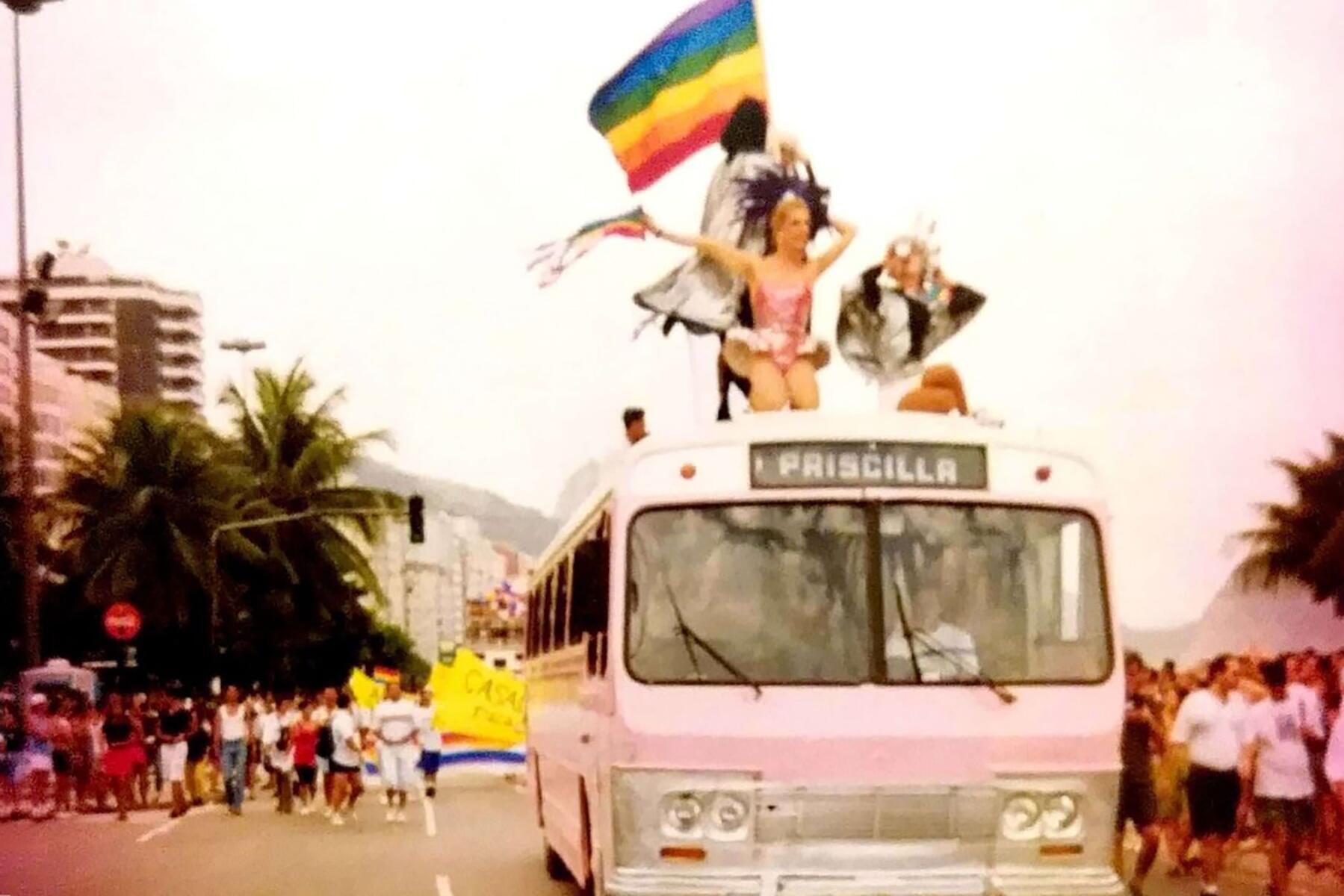In the early 1990s, Kassandra Taylor broke the barriers of prejudice in Brazil by creating the first LGBTQ+ guesthouse in the country and a replica of the Priscilla bus.
“I have always been a visionary and pioneering woman,” says Kassandra Taylor, whose sex at birth was male but who has always identified as a woman. At an early age, she knew she was different from boys, and at 14, she started her female gender transition using hormones.
“It was the boom of industrial silicone [a cheap automotive product used illegally to model the bodies of transgender people], and girls would arrive from Paris with liters in their bodies, and today they suffer for it,” recalls Taylor. “I had feminine features, so I didn’t use them.”
In the ’80s, she and some friends within the LGBTQ+ community spent seasons in Itaipuaçu, a small district with more than 15 km of wild beaches in the metropolitan region of Rio de Janeiro. Renting a house at that time was not easy. There was a lot of prejudice from landlords, and it was the peak of the AIDS epidemic in Brazil and around the world, a disease tantamount to a death sentence at the time. Taylor promised herself that one day she would return to that place with enough money to buy a house there.

In 1990, after a few years living in Europe, where she worked as a host in the main nightclubs in France, Germany, Portugal, and Italy, she returned to Brazil and bought land in Itaipuaçu. There she built her house and other spaces on the oceanfront lot. Three years later, she opened Brazil’s first LGBTQ+ guesthouse, followed by a nightclub. The district’s population of fewer than 15,000 people at the time did not take kindly to a transgender woman owning LGBTQ+ accommodations and a nightclub in that provincial region. Prejudice was much higher, and there were no laws criminalizing homophobia or transphobia in the country.
Recommended Fodor’s Video
Bringing the Priscilla Bus to Brazil
Itaipuaçu is 50 km from Copacabana and was the epicenter of gay life in Rio, and access to the guesthouse and nightclub was not affordable for everyone. In 1995, the Australian film The Adventures of Priscilla, Queen of the Desert hit theaters worldwide and helped popularize the drag queen style. For those who haven’t seen it, Priscilla told the story of a transgender woman and two drag queens driving a bus called “Priscilla” across the Outback. Inspired by it, Taylor went to a junkyard, bought an old bus, painted it pink, and turned it into a means of transportation to take people from Copacabana to her club on weekends. The initiative was a success. Everyone wanted to travel in the Brazilian version of Priscilla. The trip took around an hour, but nobody got bored. On board were drag queen performances, colored lights, and little dolls decorating the interior as Taylor drove. “The trip was a party,” says Taylor. “It was almost a disco on wheels.”

At the same time, Taylor was experiencing a period of doubt about her gender identity, and in an attempt to command more respect as a businesswoman among the conservative population of the region, she decided to return to her male origins, becoming Wilson, her name at birth.
“I was Wilson for almost ten years,” recalls Taylor. “I saw the LGBTQ+ world from another angle. I had insight that I didn’t have before as a transgender person. I went to gay ghettos where transgender people weren’t allowed in.” After that, she became a drag queen.
In a period when there was no internet, if someone wanted to have fun and meet someone else, they would have to go to nightclubs. That same year, still in the mid-’90s, the first Gay Pride in Brazil took place, held on Copacabana Beach by ILGA World (The International Lesbian, Gay, Bisexual, Trans and Intersex Association). Taylor went as a drag queen, taking her Priscilla bus with some friends. When she arrived at the famous beach, she recreated the iconic scene from the film by standing on the vehicle’s roof, which was supported by a massive high shoe. Soon, a horde of people and reporters surrounded the pink bus, wanting to know what it was all about.
“We were in the main newspapers in Brazil,” says Taylor. “It was a success. There were more than 5,000 people around us, it looked like a Carnival float.”

Saying Bye to Priscilla
Despite its success, Priscilla’s journey was short. After breaking down a few times, Taylor was afraid that something serious might happen and put the safety of the passengers at risk. The Brazilian Queen Priscilla ran for about a year but left a legacy. Taylor sold it to the same junkyard where she bought it.
While running both businesses, she also spent time in New York and Miami, where she dedicated herself to drag art. However, sometime later, Wilson decided to resume their female gender transition, and Taylor resurfaced—this time for good. At age 40, Taylor embarked on a trip to London to undergo sexual reassignment surgery. In the ’90s, the apogee of house music, Taylor was divided between Brazil and Europe. Again, she spent her time in nightclubs, where she met the French designer Jean-Paul Gaultier and saw many young transgender people lose everything to heroin addiction.
Although she does not reveal her age, she only mentions being over 50 and considers herself a woman of multiple talents. Besides being an entrepreneur, she is also an actress, musician, DJ, and illusionist, being the first and only transgender illusionist in Brazil, and according to her, in the world.
“There are no transgender people in the world of magic,” says Taylor. “It is a very male segment; even women are few; I must be the only one in the world.”

The prejudice of the residents of Itaipuaçu changed in 1997 when a school director asked Taylor if the children’s graduation could be held in her large space because the school did not have a place with good conditions to celebrate the event. She remembers that from then on, society started to see her with different eyes.
When she looks back, Taylor points out how drastically LGBTQ+ nightlife in Brazil has changed with the rise of technology. For her, everything evolved into decadence, leading to the point of no return.
“I started something for us that didn’t exist at the time in a conservative region, then came the bus, and I think it was visionary for the time,” recalls Taylor.
She has now put her entire estate up for sale, but Taylor doesn’t think that the future buyer will continue what she started 29 years ago. Today, she prefers a quieter life and lives in another city, but she continues to do magic and DJ performances.
“I became respected in my region, enjoyed life, traveled the world, loved and was loved, founded pioneering enterprises in the country, and survived the AIDS epidemic,” muses Taylor. “I am very proud of my story.”



